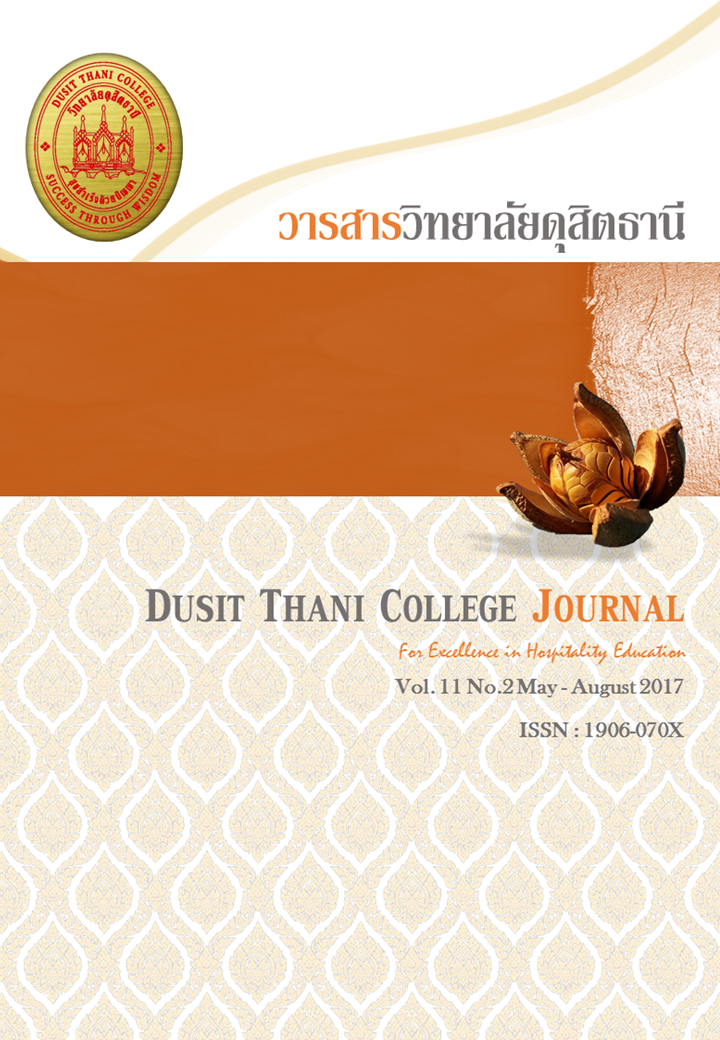สมรรถนะทางวัฒนธรรมของบุคลากรในอุตสาหกรรมบริการ The Cultural Competency of Hospitality Industry Employees.
Main Article Content
บทคัดย่อ
การวิจัยครั้งนี้มีวัตถุประสงค์เพื่อ 1) ศึกษาระดับสมรรถนะทางวัฒนธรรมของบุคลากรในอุตสาหกรรมบริการ และ 2) เปรียบเทียบระดับสมรรถนะทางวัฒนธรรมของบุคลากรในอุตสาหกรรมบริการจำแนกตามเพศ สาขาอาชีพ และสถานภาพ กลุ่มตัวอย่างที่ใช้เป็นนักศึกษาและบุคลากรในอุตสาหกรรมบริการ จำนวน 272 คน จำแนกตามเพศ สาขาอาชีพ และสถานภาพ ตัวแปรในการวิจัย คือ สมรรถนะทางวัฒนธรรม วัดผ่านตัวแปร 3 ตัว ได้แก่ ความตระหนักทางวัฒนธรรม ความรู้ความเข้าใจทางวัฒนธรรม และทักษะทางวัฒนธรรม เครื่องมือที่ใช้ในการวิจัยเป็นแบบสอบถาม วิเคราะห์ข้อมูลด้วยสถิติเชิงบรรยาย การวิเคราะห์ความแตกต่างของค่าเฉลี่ย (T-test) และการวิเคราะห์ความแปรปรวนแบบทางเดียว (ANOVA)
ผลการวิจัยสรุปได้ดังนี้ 1) บุคลากรในอุตสาหกรรมบริการ มีระดับสมรรถนะทางวัฒนธรรมอยู่ในระดับค่อนข้างสูง ( = 4.16) โดยบุคลากรที่กำลังเข้าสู่อุตสาหกรรมบริการและบุคลากรที่กำลังปฏิบัติงานอุตสาหกรรมบริการ มีระดับสมรรถนะทางวัฒนธรรมอยู่ในระดับเดียวกัน คือ ค่อนข้างสูง ( = 4.13, 4.24 ตามลำดับ) 2) บุคลากรในอุตสาหกรรมบริการที่มีเพศแตกต่างกันมีระดับสมรรถนะทางวัฒนธรรมไม่แตกต่างกัน ส่วนบุคลากรที่อยู่ในสาขาการจัดการโรงแรมและรีสอร์ทมีระดับสมรรถนะทางวัฒนธรรมสูงกว่าบุคลากรในสาขาการจัดการครัวฯ ท่องเที่ยว ไมซ์ฯ และสปา อย่างมีนัยสำคัญทางสถิติที่ระดับ .05 และบุคลากรที่กำลังปฏิบัติงานอุตสาหกรรมบริการมีระดับสมรรถนะทางวัฒนธรรมสูงกว่าบุคลากรที่กำลังเข้าสู่อุตสาหกรรมบริการอย่างมีนัยสำคัญทางสถิติที่ระดับ .05
Article Details
นโยบายการพิจารณากลั่นกรองบทความ
- บทความวิจัยและบทความวิชาการทุกเรื่องที่จะได้รับการตีพิมพ์ต้องผ่านการพิจารณากลั่นกรองโดยผู้ทรงคุณวุฒิ (Peer Review) ในสาขาที่เกี่ยวข้อง จำนวน 3 ท่าน/บทความ
- บทความ ข้อความ ภาพประกอบและตารางประกอบที่ลงตีพิมพ์ในวารสารเป็นความคิดเห็นส่วนตัวของผู้เขียน กองบรรณาธิการไม่จำเป็นต้องเห็นด้วยเสมอไป และไม่มีส่วนรับผิดชอบใด ๆ ถือเป็นความรับผิดชอบของผู้เขียนแต่เพียงผู้เดียว
- บทความที่จะได้รับการตีพิมพ์จะต้องไม่เคยตีพิมพ์ เผยแพร่ที่ใดมาก่อน และไม่อยู่ระหว่างการพิจารณาของวารสารฉบับอื่น หากตรวจสอบพบว่ามีการตีพิมพ์ซ้ำซ้อน ถือเป็นความรับผิดชอบของผู้เขียนแต่เพียงผู้เดียว
- บทความใดที่ผู้อ่านเห็นว่าได้มีการลอกเลียนหรือแอบอ้างโดยปราศจากการอ้างอิง หรือทำให้เข้าใจผิดว่าเป็นผลงานของผู้เขียน กรุณาแจ้งให้กองบรรณาธิการวารสารทราบจะเป็นพระคุณยิ่ง
เอกสารอ้างอิง
Chantarasenanon, Chutinun. (2010). Development of A Cultural Competence Scale for Secondary School Students. dissertation, Educational Measurement and Evaluation. Faculty of Eduaction, Chulalongkorn University.
Clair, A.S. & McKenry. L. (1999). Preparing culturally competent practitioners. Journal of Nursing Education, 38(5), 228-234.
Cross, T.L. (2006). Cultural competence continuum. [Online] Available from:
https://www.nyscc.org/T-Rarts/CultCompCont.htmle. [2015, April 24]
Davies, A., Fidler, D., & Gorbis. D. (2011). Future Work Skills 2020. Palo Alto, CA: Institute for the Future for University of Phoenix Research Institute. [Online] Available from: https://www.iftf.org/uploads/media/SR1382A_UPRI_future_work _skills_sm.pdf
Janchai, Worawit. (2013). Competency Model for Student in Work-Integrated Learning Program: Approaches for e-Tourism Business. The College of Arts, Media and Technology. Chiang Mai University.
Jauhari, V. (2006). Competencies for a career in the hospitality industry: an Indian perspective. International Journal of Contemporary Hospitality Management, 18(2), 123-134.
Leavitt, R. L. (2002). Developing cultural competence in a multicultural world. Magazine of Physical Therapy, 36.
Luckmann, j. (1999). Transcultural communication in nursing. Albany, NY: Delmar Publications.
McDonald, D. P., McGuire, G., Johnston, J., Selmeski, B., & Abbe, A. (2008). Developing and managing cross-cultural competence within the Department of Defense: Recommendations for learning and assessment. Paper submitted to Defense Language Office, Arlington, VA.
National Association of Social Workers. (2001). NASW Standards for Cultural Competence in Social Work Practice. Washington, DC: NASW Press.
Office of the Higher Education Commission. (2013). Education Plan 10. Bangkok: Chula Press.
Puncreobutr, Vichian. (2014). Professional and Cross-cultural Competences of Thai Graduates to Work in ASEAN Context. Journal of Community Development and Life Quality. 2(2), 225-232.
Siriphan, Siriphan. (2014). Teaching methods for Enhancing Cultural Competency of Nursing Students Based on Theoretical Concepts of Capinha-Bacote. Princess of Naradhivas University Journal. 6(1), 146-157.
Vance, C. M., Silbeck, G., McNulty, Y., and Hogenauer, A. (2011). Building global competencies through experiential coursework in international travel and tourism. Journal of international Education in Business. 4(1), 30-41.
Zakaria, N. (2000). The effects of cross-cultural training on the acculturation process
of the global workforce. International Journal of Manpower, 21(6), 492-511.


